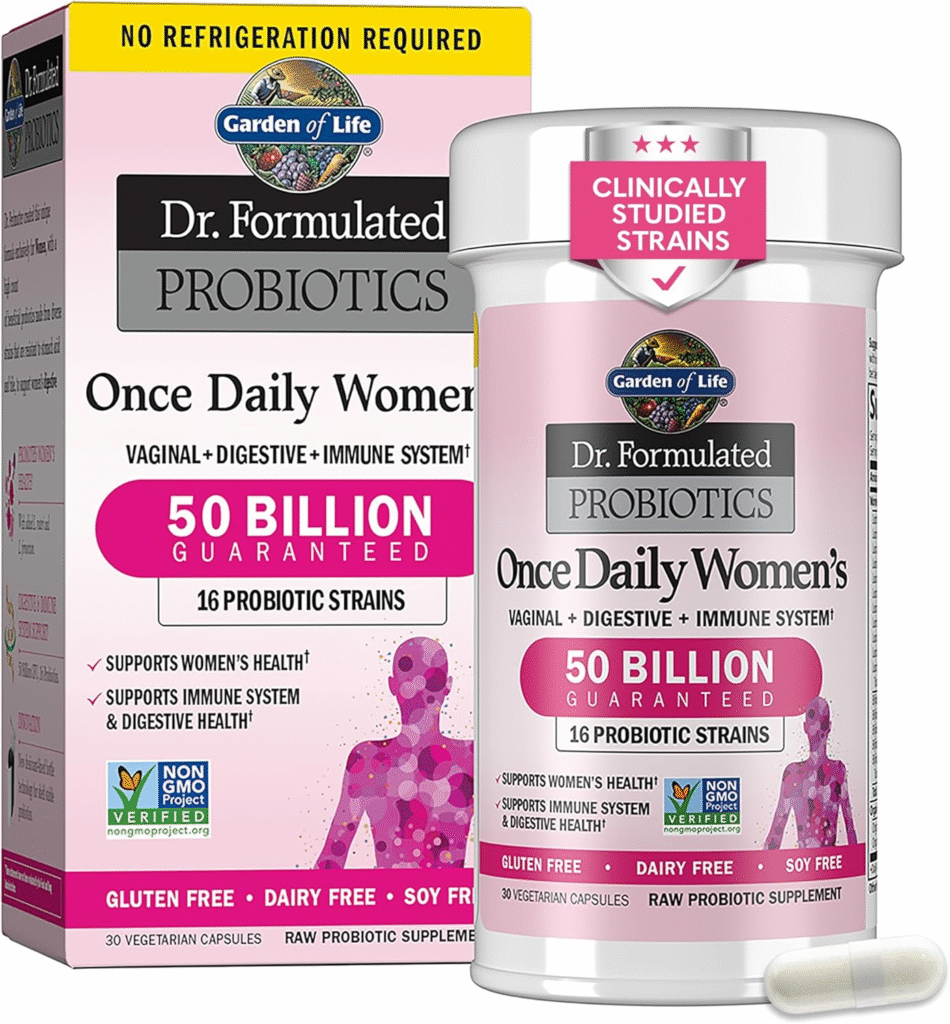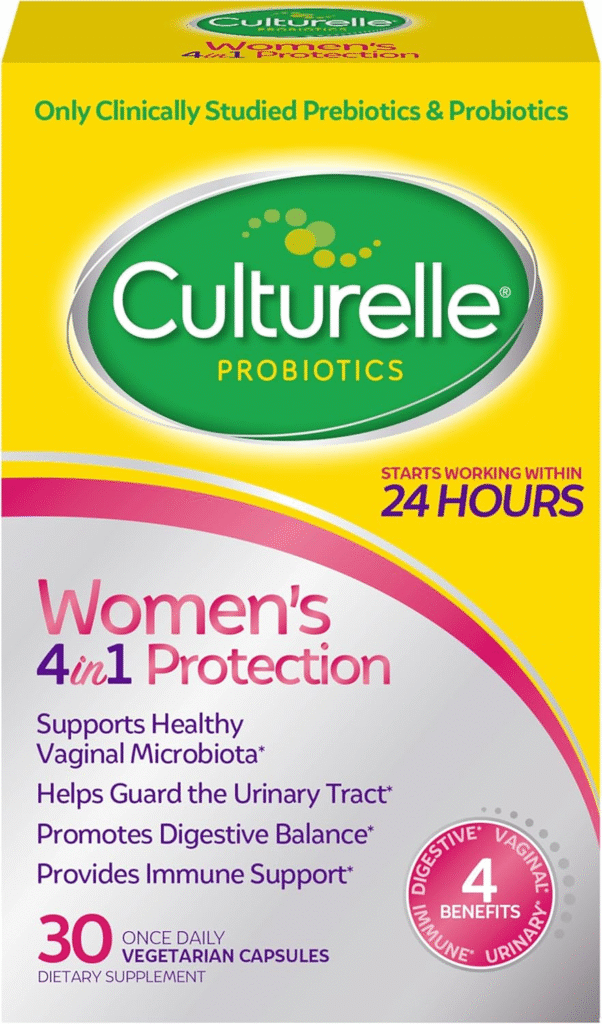Hormonal bloating can be incredibly uncomfortable and frustrating. As someone who’s dealt with this issue firsthand, I know how it feels when your body seems to be working against you.
The good news is that probiotics can be a game-changer in managing these symptoms.
Let’s explore the top 5 probiotics that can help you say goodbye to that uncomfortable, bloated feeling.
1. Garden of Life Dr. Formulated Probiotics for Women
Garden of Life’s Dr. Formulated Probiotics for Women is a standout product for tackling hormonal bloating. This probiotic blend is specifically designed with women’s health in mind, featuring an impressive 50 billion CFU and 16 probiotic strains.
What makes this probiotic particularly effective is its inclusion of L. Reuteri and L.
Fermentum.
These two strains have been shown to support vaginal health and help maintain a balanced pH. They work in conjunction with other strains like L.
Acidophilus and B.
Lactis to promote digestive health and reduce bloating.
Key Features:
- 50 billion CFU
- 16 probiotic strains
- Includes L. Reuteri and L.
Fermentum for vaginal health
- Shelf-stable formula

2. Renew Life Ultimate Flora Women’s Care Probiotic
Renew Life’s Ultimate Flora Women’s Care Probiotic is another excellent option for combating hormonal bloating. This supplement boasts 25 billion live cultures and 12 probiotic strains, designed to support both digestive and vaginal health.
One of the standout features of this probiotic is its high concentration of Lactobacillus strains. These strains are particularly useful for women’s health, helping to maintain the delicate balance of bacteria in the vaginal and urinary tracts.
This balance can be disrupted by hormonal changes throughout the menstrual cycle, making these strains especially valuable.
The delayed-release capsules ensure that the probiotics survive the harsh stomach acid and reach the intestines where they can be most effective.
Key Features:
- 25 billion live cultures
- 12 probiotic strains
- High concentration of Lactobacillus strains
- Delayed-release capsules

3. Seed Daily Synbiotic
Seed’s Daily Synbiotic takes a unique approach to gut health. This product combines both probiotics and prebiotics, creating what’s known as a synbiotic.
With 24 broad-spectrum strains, this supplement offers a comprehensive approach to gut health.
What sets Seed apart is its innovative 2-in-1 capsule technology. The outer capsule contains prebiotics derived from pomegranate and Indian pomegranate, which serve as food for the useful bacteria.
The inner capsule houses the probiotic strains, protected by an algae delivery system that confirms their survival through the digestive system.
Key Features:
- 24 broad-spectrum strains
- Combines probiotics and prebiotics
- 2-in-1 capsule technology
- Sustainable packaging

4. Culturelle Women’s Healthy Balance
Culturelle Women’s Healthy Balance has earned its place in my top 5 list for its targeted approach to women’s health. This probiotic contains 15 billion CFU of the clinically studied Lactobacillus rhamnosus GG strain, along with four other strains chosen specifically for women’s health.
The simplicity of this probiotic is one of its strengths. Instead of overwhelming users with dozens of strains, Culturelle focuses on a few key players that have been well-researched for their benefits to women’s health.
The L.
Rhamnosus GG strain, in particular, has been shown to support digestive health and boost immune function.
Key Features:
- 15 billion CFU
- Focuses on Lactobacillus rhamnosus GG strain
- Targeted approach for women’s health
- Gentle on the stomach

5. Jarrow Formulas Fem-Dophilus
Rounding out our top 5 is Jarrow Formulas Fem-Dophilus. This probiotic stands out for its focus on two specific strains: L.
Reuteri RC-14 and L.
Rhamnosus GR-1. These strains have been clinically studied for their benefits to women’s urogenital health.
While the CFU count might seem low compared to some other probiotics (1 billion CFU per capsule), these strains are incredibly potent. They have been shown to effectively colonize the vaginal tract, helping to maintain a healthy pH balance and combat issues like yeast overgrowth.
Key Features:
- Focuses on L. Reuteri RC-14 and L.
Rhamnosus GR-1 strains
- Supports urogenital health
- Helps maintain vaginal pH balance
- No refrigeration required

Understanding Hormonal Bloating
Before we dive deeper into how these probiotics can help, it’s important to understand what hormonal bloating is and why it occurs. Hormonal bloating typically happens during the luteal phase of the menstrual cycle, which is the time between ovulation and the start of your period.
During this phase, estrogen levels drop while progesterone levels rise.
Progesterone can cause water retention, which leads to that uncomfortable bloated feeling. Additionally, hormonal fluctuations can affect the gut microbiome, potentially leading to increased gas production and slower digestion, further contributing to bloating.
How Probiotics Can Help with Hormonal Bloating
Probiotics can be useful in managing hormonal bloating in several ways:
- Balancing the Gut Microbiome: Probiotics help maintain a healthy balance of bacteria in your gut.
This balance is crucial for proper digestion and can help reduce gas production, which often contributes to bloating.
- Supporting Hormone Metabolism: Some probiotic strains can help metabolize and eliminate excess estrogen from the body.
This can be particularly helpful if you’re dealing with estrogen dominance, a condition that can exacerbate hormonal symptoms including bloating.
- Reducing Inflammation: Certain probiotic strains have anti-inflammatory properties.
Inflammation in the gut can contribute to bloating, so reducing this inflammation can help reduce symptoms.
- Improving Gut Motility: Some probiotics can help improve the movement of food through your digestive system.
This can help prevent constipation, which often accompanies hormonal bloating.
- Supporting the Gut-Brain Axis: Probiotics can influence the gut-brain axis, potentially helping to regulate the production of neurotransmitters that affect mood and stress levels.
Since stress can exacerbate hormonal symptoms, this indirect effect can be useful.
Choosing the Right Probiotic for You
While I’ve shared my top 5 picks for probiotics to reduce hormonal bloating, it’s important to remember that everyone’s body is different. What works well for one person may not be as effective for another.
Here are some factors to consider when choosing a probiotic:
- Strain Diversity: Look for probiotics that contain a variety of strains.
Different strains can have different benefits, so a diverse mix can provide more comprehensive support.
- CFU Count: CFU stands for Colony Forming Units, which shows the number of viable bacteria in each dose.
Higher CFU counts aren’t always better, but for addressing specific issues like hormonal bloating, a count of at least 10-20 billion CFU is often recommended.
- Targeted Formulas: Some probiotics are specifically formulated for women’s health or to address specific issues like bloating.
These can be good options if you’re dealing with hormonal bloating.
- Shelf Stability: If you travel often or prefer not to refrigerate your supplements, look for shelf-stable probiotics.
- Additional Ingredients: Some probiotics include prebiotics or other supportive ingredients.
These can enhance the effectiveness of the probiotic strains.
- Quality and Manufacturing: Choose probiotics from reputable companies that adhere to good manufacturing practices.
Look for third-party testing or certifications.
Incorporating Probiotics into Your Routine
To get the most benefit from your probiotic supplement, consistency is key. Here are some tips for incorporating probiotics into your daily routine:
- Take Them Regularly: For best results, take your probiotic supplement daily, even when you’re not experiencing symptoms.
- Timing Matters: Some probiotics are best taken on an empty stomach, while others can be taken with food.
Follow the instructions on your specific product.
- Pair with Prebiotics: Consuming prebiotic foods (like garlic, onions, and bananas) can help feed the useful bacteria in your gut, enhancing the effects of your probiotic supplement.
- Be Patient: It can take several weeks to notice the full benefits of probiotics.
Give your chosen supplement at least a month before deciding if it’s effective for you.
- Consider Cycling: Some experts recommend cycling between different probiotic strains every few months to expose your gut to a variety of useful bacteria.
Lifestyle Factors to Support Probiotic Effectiveness
While probiotics can be incredibly helpful in managing hormonal bloating, they work best when combined with other healthy lifestyle habits. Here are some extra steps you can take to support your gut health and reduce hormonal bloating:
- Stay Hydrated: Drinking plenty of water can help flush out excess sodium and reduce water retention.
- Eat a Balanced Diet: Focus on whole foods, including plenty of fruits, vegetables, and fiber.
These foods support a healthy gut microbiome.
- Reduce Salt Intake: Excess sodium can contribute to water retention and bloating.
- Manage Stress: High stress levels can negatively impact your gut health.
Practice stress-reduction techniques like meditation or yoga.
- Exercise Regularly: Physical activity can help improve digestion and reduce bloating.
- Avoid Trigger Foods: Keep track of foods that seem to worsen your bloating and consider reducing or eliminating them from your diet.
- Get Enough Sleep: Poor sleep can affect hormone levels and gut health.
Aim for 7-9 hours of quality sleep each night.
Potential Side Effects and Precautions
While probiotics are generally safe for most people, it’s important to be aware of potential side effects and take necessary precautions:
- Initial Digestive Discomfort: When first starting a probiotic, you might experience temporary gas, bloating, or changes in bowel movements.
This usually subsides within a few days to a week.
- Allergic Reactions: If you have allergies, check the ingredient list carefully.
Some probiotics may contain allergens like dairy or soy.
- Interactions with Medications: If you’re taking any medications, especially antibiotics or immunosuppressants, ask with your healthcare provider before starting a probiotic.
- Quality Control: Choose probiotics from reputable manufacturers to ensure you’re getting a high-quality product.
- Specific Health Conditions: If you have a compromised immune system or certain digestive disorders, talk to your doctor before taking probiotics.
When to Consult a Healthcare Professional
While probiotics can be helpful for many women dealing with hormonal bloating, there are times when it’s important to ask a healthcare professional:
- Severe or Persistent Symptoms: If your bloating is severe, persistent, or accompanied by pain, it’s important to rule out other underlying conditions.
- Irregular Menstrual Cycles: If you’re experiencing irregular periods along with bloating, this could show a hormonal imbalance that needs medical attention.
- Other Digestive Symptoms: If you’re experiencing other digestive issues like chronic diarrhea, constipation, or blood in your stool, see a doctor.
- Before Starting Any New Supplement: If you have any existing health conditions or are taking medications, it’s always wise to ask with a healthcare provider before starting a new supplement regimen.
- Pregnancy or Breastfeeding: If you’re pregnant or breastfeeding, check with your healthcare provider before taking any new supplements, including probiotics.
Key Takeaways
Hormonal bloating can be a challenging and uncomfortable experience, but probiotics offer a promising solution. The five probiotics we’ve discussed, Garden of Life Dr. Formulated Probiotics for Women, Renew Life Ultimate Flora Women’s Care Probiotic, Seed Daily Synbiotic, Culturelle Women’s Healthy Balance, and Jarrow Formulas Fem-Dophilus, each offer unique benefits for managing hormonal bloating and supporting overall gut health.
Finding the right probiotic for you may take some trial and error. Pay attention to how your body responds and give each probiotic a fair trial period before deciding if it’s effective for you.
Combine your probiotic regimen with a healthy lifestyle, including a balanced diet, regular exercise, and stress management techniques, for the best results.
While probiotics can be a powerful tool in managing hormonal bloating, they’re not a magic solution. If you’re experiencing severe or persistent symptoms, it’s always best to ask with a healthcare professional.
With the right approach, you can find relief from hormonal bloating and improve your overall gut health.
People Also Asked
What causes hormonal bloating?
Hormonal bloating is primarily caused by fluctuations in estrogen and progesterone levels during the menstrual cycle. These hormonal changes can lead to water retention and slower digestion, resulting in bloating.
How long does hormonal bloating last?
Hormonal bloating typically starts a few days before the onset of menstruation and can last through the first few days of the period. For some women, it may continue for up to a week.
Can probiotics help with PMS symptoms?
Yes, probiotics can help with various PMS symptoms, including bloating, mood swings, and digestive issues. They support gut health, which is closely linked to hormonal balance and overall well-being.
Are there any foods that can help reduce hormonal bloating?
Several foods can help reduce hormonal bloating, including:
- Potassium-rich foods like bananas and avocados
- Anti-inflammatory foods like berries and leafy greens
- Diuretic foods like cucumber and watermelon
- Probiotic-rich foods like yogurt and kefir
How quickly do probiotics work for bloating?
The time it takes for probiotics to work can vary, but many people start to notice improvements in bloating within 2-4 weeks of consistent use. However, it may take up to 3 months to experience the full benefits.
Can probiotics help with weight gain during menstruation?
While probiotics aren’t directly linked to fat loss, they can help manage water retention and bloating, which may contribute to temporary weight gain during menstruation. They also support overall digestive health, which can indirectly affect weight management.
Is it safe to take probiotics daily?
For most people, it’s safe to take probiotics daily. However, it’s always best to follow the dosage instructions on the product label and ask with a healthcare provider if you have any concerns.
Can probiotics affect hormone levels?
Probiotics don’t directly alter hormone levels, but they can support the body’s natural hormone metabolism and elimination processes. This can help maintain hormonal balance, potentially reducing symptoms of hormonal imbalance.
Are there any side effects of taking probiotics for hormonal bloating?
While probiotics are generally safe, some people may experience temporary side effects when first starting them, such as mild gas or bloating. These effects usually subside as your body adjusts to the probiotics.
How do I choose the best probiotic for hormonal bloating?
When choosing a probiotic for hormonal bloating, look for:
- Strains that support women’s health (like Lactobacillus and Bifidobacterium)
- A CFU count of at least 10-20 billion
- A product specifically formulated for women’s health or digestive issues
- Quality manufacturing practices and third-party testing
Disclaimer
The information contained in this post is for general information purposes only. The information is provided by Top 5 Probiotics to Alleviate Hormonal Bloating and while we endeavor to keep the information up to date and correct, we make no representations or warranties of any kind, express or implied, about the completeness, accuracy, reliability, suitability or availability with respect to the website or the information, products, services, or related graphics contained on the post for any purpose.

